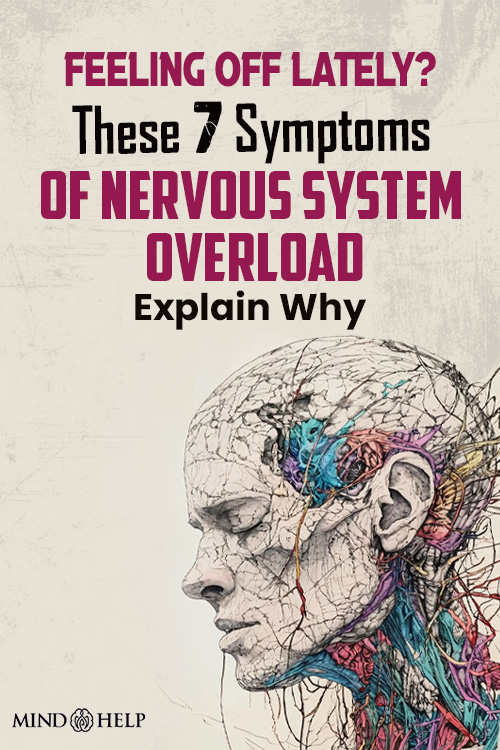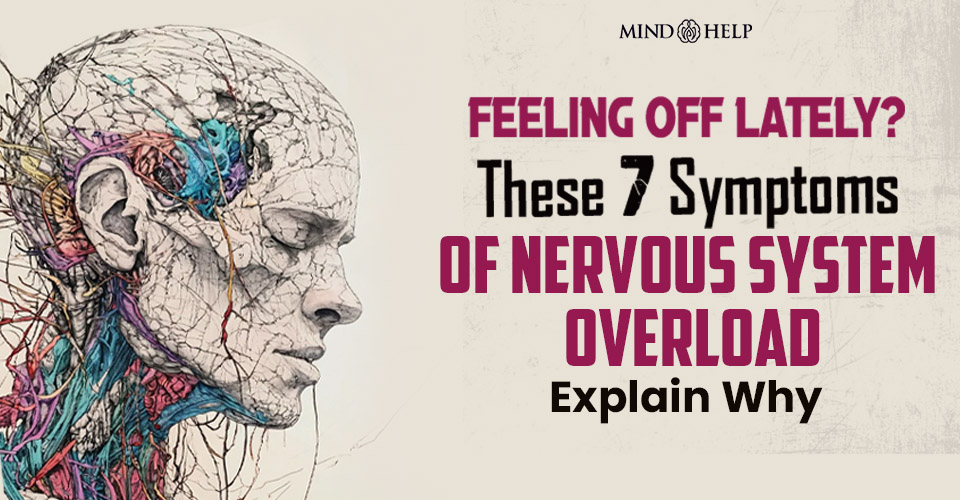The symptoms of nervous system overload often sneak up quietly – a racing heart, constant fatigue, or that uneasy restlessness you can’t quite explain. These are not random; they are clear signs of a dysregulated nervous system struggling to stay balanced.
When you are running on stress for too long, your overwhelmed nervous system goes into survival mode, like hijacking your focus, energy, and emotional stability. It’s your body’s way of saying it’s time for a nervous system reset.
Understanding how to calm your nervous system isn’t just about self-care; it’s about restoring your inner equilibrium, grounding your emotions, and helping your body finally exhale.
In this article, we will explore the hidden cues of a dysregulated nervous system and the simple yet powerful ways to bring yourself back to balance.
Related: How To Rewire Trauma Responses: 3 Tools to Regulate Your Nervous System
Your Body’s Begging for Help: 7 Hidden Symptoms of Nervous System Overload
1. You feel like you are always ‘on’.
Your mind won’t shut up, your shoulders are tense, and you can’t remember what calm even feels like. This constant “on” mode is one of the biggest signs of a dysregulated nervous system.
You are stuck in survival gear – hyper-focused, jumpy, or overthinking everything. Even when nothing’s wrong, your brain acts like danger is lurking around the corner. It’s your body’s way of saying, “I’m tired of running this marathon with no finish line.”
Try slowing your breath, unclenching your jaw, and reminding your body it’s safe – small steps that actually calm your overwhelmed nervous system over time.

2. Your sleep feels useless.
You slept for eight hours last night, however, you woke up feeling even more tired and groggy. Well, when you have a dysregulated nervous system, your body never really exits alert mode, not even when you are sleeping.
You toss and turn the whole night, or wake up repeatedly without any reason. This is because your stress hormones remain active, telling your body to remain “on guard.”
A gentle nervous system reset can look like creating a bedtime routine that helps you unwind – think dim lights, slow breathing, no phone-scrolling, and quiet time. Your body can’t heal if it doesn’t feel safe enough to rest.
3. You are snapping at people for no reason.
You drop your pen, and suddenly you feel like giving up on everything and crying. That’s not you being “dramatic” – that’s a dysregulated nervous system reacting. When your stress bucket is full, even small frustrations feel like the end of the world.
You may feel impatient, irritable, or find yourself apologizing again and again for your outbursts. This is not willpower, it’s biology. Your emotional balance is based on the stability of your nervous system.
So, what is the solution to this? Take some mini-breaks throughout the day – maybe step outside for a few minutes, practice some deep breathing, or do some yoga. These small resets can calm your nervous system, before it decides to scream for attention again.
4. You feel disconnected, like you are watching life happen.
One of the subtle symptoms of nervous system overload is this. When it’s overstimulated for a very long time, sometimes it goes the other way; instead of overreacting, it shuts down. You feel disconnected, emotionally numb, or “not really present.”
That’s your body’s freeze response, one of the signature signs of a dysregulated nervous system. It’s your brain’s attempt to keep you safe from excessive stress. The problem is, it also shuts out connection and happiness.
Try gentle ways to re-engage your senses – touch something soft, feel your feet on the ground, or breathe in a scent you love. These small cues signal safety and help reset a dysregulated nervous system.
Related: 7 Everyday Things You Can Do to Heal And Support Your Nervous System
5. Your gut is acting up – constantly.
Butterflies before a big meeting are normal. But stomach pain, nausea, or bloating out of nowhere? That’s your nervous system talking through your gut. The brain-gut connection is real – when your mind is overwhelmed, your digestive system takes the hit.
Chronic tension messes with digestion, appetite, and even your microbiome. This is another overlooked sign of a dysregulated nervous system. To soothe it, slow down when you eat, chew properly, and breathe deeply before meals.
It’s simple, but it signals your body: “We’re not in danger. You can relax now.”
6. You can’t focus or remember things.
If you find yourself constantly re-reading the same sentence or walking into rooms forgetting why, your overwhelmed nervous system may be behind it.
Chronic stress siphons energy away from “non-essential” tasks such as memory and concentration towards survival. Your brain’s like, “Concentrate? Sorry, we are too busy fighting imaginary bears today.”
However, the good news is that your focus comes back when your calm does. Try to do one thing at a time, because too much of multitasking can make you feel even more stressed out.
If you feel like you’re losing your focus, stop, take three deep breaths, and re-center. That’s one of the easiest ways to soothe your nervous system in real time.
7. You don’t feel like yourself anymore.
If you find yourself wondering if you have lost your spark – your creativity, your sense of humor, your patience – that’s not you fading; that’s your dysregulated nervous system burning out.
Constant overactivation depletes your dopamine and serotonin levels, and you feel like you are always in survival mode. One of the most difficult symptoms of nervous system overload is emotional flatness, since it’s quite hard to notice, as it creeps in slowly.
To bounce back, give yourself the permission to do things that bring ease, like laughter, slow mornings, soft music, or just nothing at all. Joy itself can be a nervous system reset.
Okay, let’s talk a bit about how to calm your nervous system.
How to Calm Your Nervous System
So, how in the world do you really calm an overwhelmed nervous system? You don’t need a pricey retreat or hours of meditation. True healing begins small.
Here’s how you can do that:
- Practice deep breathing: Take long exhales till your brain feels calm and safe.
- Move your body: Walking or stretching releases pent-up tension.
- Ground yourself: Observe what you see, hear, and sense with your body – it grounds you in the present.
- Sleep more intentionally: Create a soothing pre-sleep ritual.
- Connect: Safe and healthy relationships calm your nervous system as well.
These habits pay off because they remind your body what relaxation looks like — something a dysregulated nervous system forgets over time.

Takeaway
Your body isn’t betraying you – it’s begging you to slow down. The signs of a dysregulated nervous system often masquerade as “random problems,” but once you start noticing the pattern, you can begin to respond with compassion instead of frustration.
Each deep breath, each mindful moment, is a tiny act of repair.
Related: 11 Scary Symptoms of A Nervous Breakdown
So if you have been feeling off lately – tired, jumpy, disconnected, or just not yourself – it might be time for that long-overdue nervous system reset. Your body’s been whispering for help; now, it’s your turn to listen.








